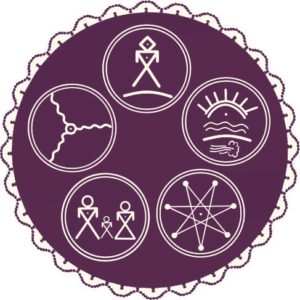What the Anishinabek Nation Governance Agreement is about

The purple pictograph illustrates Ngo Dwe Waangizid Anishinaabe – One Anishinaabe Family, the Preamble of the Anishinaabe Chi-Naaknigewin.
By Mary Laronde
The proposed Anishinabek Nation Governance Agreement is about Canada’s recognition of First Nation jurisdiction over governance matters:
- Who is an Anishinabek First Nation citizen? (Citizenship)
- How we speak, think, and act. (Language and Culture)
- How we govern ourselves. (Selection of Leaders and the Operation and Management
of First Nation Government)
We say these are inherent jurisdictions and based on Inherent Rights. But what is inherent jurisdiction? For First Nations, inherent jurisdiction has been in place since time immemorial. It is integral to the culture, traditions, customs, practices and identities of First Nations.
The Governance Agreement does not define or alter Inherent Rights. Inherent Rights exist outside of Canada’s constitutional framework as they are pre-existing rights and given to us by the Creator. The Constitution Act, 1982 confirms “existing Aboriginal and treaty rights”.
The Governance Agreement does not interpret or define Aboriginal or treaty rights. Aboriginal and treaty rights are protected in the Governance Agreement.
It is not about sovereignty. Our sovereignty does not depend on Canada. Either we have sovereignty or we don’t. You don’t negotiate sovereignty, you live it. Speaking Anishinaabemowin and living under Anishinaabe Law is sovereignty.
The four areas of jurisdiction Canada is recognizing have great importance. These jurisdictions set the foundation for First Nation governance in all areas. This is why a First Nation constitution is important. It provides structure and stability for a First Nation and its citizens.
We as Anishinaabeg determine E’dbendaagizijig (those who belong), who our leaders are, how our First Nation Government operates, and how we live as Anishinaabe, using our language, knowledge, culture, traditions, customs, and practices.
We are removing the authority of Indian Affairs to decide on our election appeals, membership appeals, and how our Chief and Council govern.
The proposed Governance Agreement does not tell us what our laws will look like. We are taking responsibility for our own governance. The Agreement removes us from being governed by Sections 8-14, 74-79, and 80 of the Indian Act. The tax exemption, Section 87, still applies.


